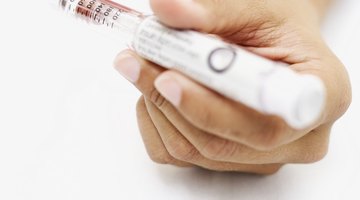How Do I Decrease HCG Levels?
After the emotional and physical pain of a miscarriage one more burden is laden on you -- the wait for your hormones to return to normal. Women attempting to get pregnant again, whether by artificial or natural means, must wait until their human chorionic gonadotrophin, or HCG for short, is back to a baseline reading of less than 5 milli-international units per milliliter. HCG stops the menstrual cycle to support a pregnancy and you cannot get pregnant while HCG is still circulating in your system.
Coordinate blood tests with your doctor. She will arrange quantitative HCG testing, which is a measurement of the amount of this hormone present in your blood. If you have suffered a miscarriage the number should steadily drop over the next four to six weeks.
Discuss the HCG numbers with your doctor or nurse. Avoid taking home pregnancy tests as they do not tell you the quantifiable amount of HCG in your urine, only whether or not it is present. During pregnancy, your HCG may vary from 440 to 142,230 mIU/ml. The number will steadily decrease naturally over the next few weeks.
Do daily yoga, deep breathing or meditation exercises. You have no control over the hormone levels in your body but you can control stressing over it. You may prefer to quietly read a book or listen to soothing music. Do anything that takes your mind off HCG for a while.
Drink plenty of water daily, eat a varied, healthful diet and attempt 30 minutes of exercise daily. This will prepare and sustain your body through a difficult emotion time and for future pregnancy attempts, if that is your desire. Although unproven, exercise stimulates the blood to circulate through your body faster, perhaps helping you flush out remaining HCG.









